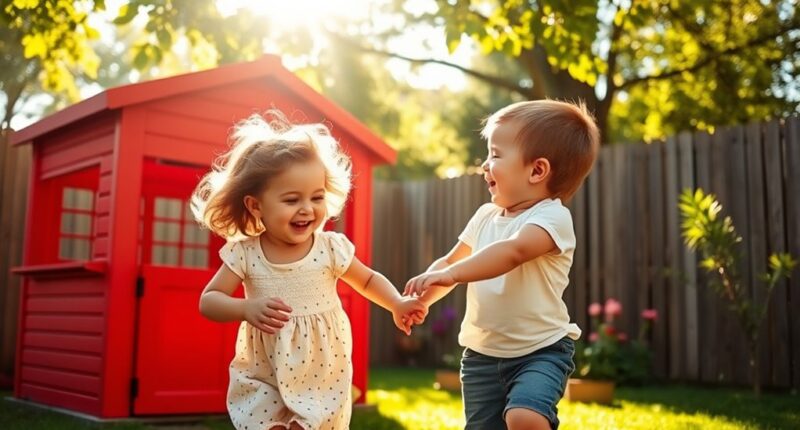Fostering strong sibling bonds in toddlers is crucial for their emotional and social development. Encourage cooperative play that emphasizes teamwork and communication to build trust. Managing conflicts with empathy and using techniques like “I feel” statements can enhance relationships. It’s important to maintain fair treatment and involve parents to mediate disputes effectively. Engaging in shared experiences, like group games and creative activities, strengthens connections even further. Discover more strategies to nurture these fundamental relationships as they grow.
Key Takeaways
- Encourage cooperative play through games that emphasize teamwork, fostering shared experiences between toddlers and siblings.
- Create structured activities that allow individual participation to reduce competition and enhance enjoyment among siblings.
- Model healthy conflict resolution techniques, teaching toddlers to communicate feelings and address disagreements constructively.
- Engage in regular shared family events, ensuring individual attention to each child to prevent rivalry and strengthen sibling bonds.
- Support emotional expression by validating toddlers’ feelings, promoting empathy and understanding in sibling relationships.
Understanding Sibling Dynamics in Early Childhood

Understanding sibling dynamics in early childhood is essential because these relationships lay the groundwork for emotional and social development. Sibling interactions are often emotionally charged, blending positive and negative feelings. As siblings spend considerable time together, they provide each other with crucial emotional and practical support. The presence of clear boundaries in sibling relationships can help minimize conflicts and foster healthier interactions.
Individual differences in relationship quality can vary greatly, influenced by parental guidance. Parents play a critical role in shaping these dynamics, as their involvement can foster healthier interactions. In these formative years, siblings learn about emotions and empathy, setting the stage for future relationships. Research shows that strong communication skills among siblings enhance their ability to resolve conflicts and support each other effectively. Additionally, the skills learned in sibling relationships can lead to greater emotional intelligence, which is vital for successful peer interactions later in life. Furthermore, the development of emotional regulation skills through sibling interactions can significantly impact their capabilities in managing relationships with peers as they grow older. Regular monitoring of production quantity variance in family activities can also enhance the quality of sibling interactions by ensuring equitable sharing of attention and resources.
The way siblings relate to one another not only affects their current bonding but also impacts their socioemotional skills, which influence peer interactions later in life.
The Impact of Age Gaps on Sibling Interactions
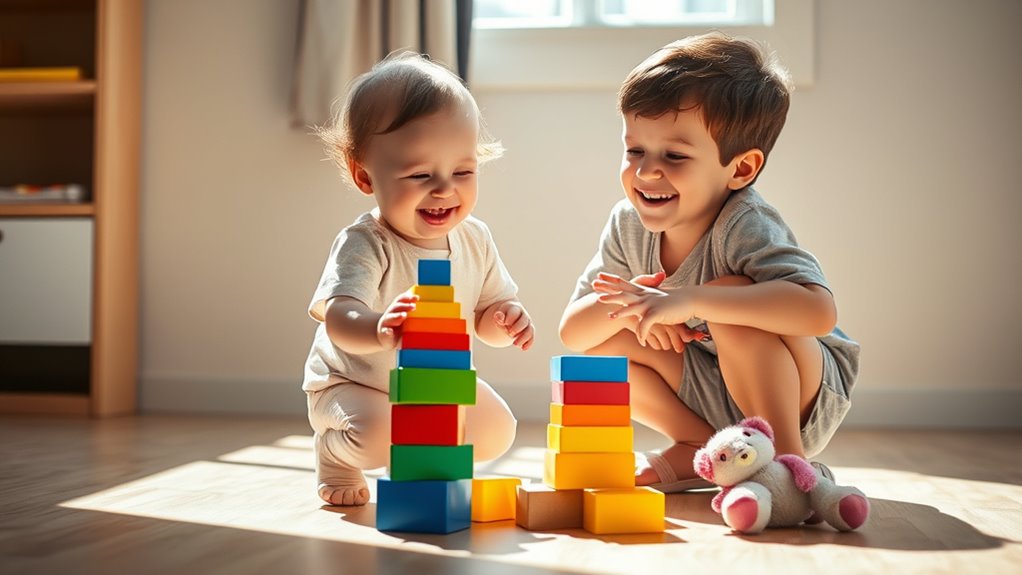
The age gap between siblings greatly shapes their interactions and relationships. When siblings are more than two years apart, they often experience less conflict and greater affection. Additionally, siblings with larger age gaps may benefit from a stronger sense of work-life balance, as they can develop their own interests and friendships outside of immediate sibling dynamics. Furthermore, having a supportive environment can encourage good grief as siblings learn to navigate their emotions together during challenging times. It is essential for parents to foster open communication between siblings to help them express their feelings and support one another. Moreover, investment in relationships can be crucial for developing strong sibling bonds.
The age gap between siblings significantly influences their relationship, often leading to more affection and less conflict when spaced more than two years apart.
Conversely, those with closer age gaps, particularly less than 21 months, may face persistent rivalry and jealousy, impacting their emotional bond. Younger siblings often imitate older ones, which can foster learning but also create power dynamics. Notably, siblings more than 3.5 years apart tend to score higher in math, indicating that larger gaps can enhance educational outcomes. Additionally, establishing consistent routines can help mitigate rivalry and foster a more supportive sibling relationship.
As siblings grow, their interactions can shift from rivalry to supportive friendships, highlighting the significance of age differences in shaping lifelong connections and family dynamics.
Parental Influence on Sibling Relationships

When parents actively nurture their children’s relationships, they can greatly shape the bonds between siblings. Strong emotional connections within the family foster affection and reduce conflicts. Research indicates that strong emotional connections are key to creating a supportive family environment. Additionally, fostering emotional resilience helps children navigate their relationships more effectively. This development is influenced by biological, cognitive, and social factors, which play a crucial role in how siblings interact with one another.
Incorporating positive thinking strategies can also help siblings develop a more supportive and nurturing relationship. You’ll want to guarantee consistent discipline and rules across your children to promote unity. Authoritative parenting, which balances warmth and guidance, leads to fewer sibling disputes.
Remember, emotional support matters; showing affection equally can minimize rivalry. Engaging in family traditions and activities strengthens these ties even more.
Be aware of how you treat each child; perceived unfairness can spark conflict. By being involved in conflict resolution and maintaining an atmosphere of emotional warmth, you can create a positive environment that nurtures lasting sibling relationships. Additionally, incorporating gentle methods can help in resolving conflicts and enhancing emotional bonds among siblings.
Cognitive and Social Development Through Sibling Play
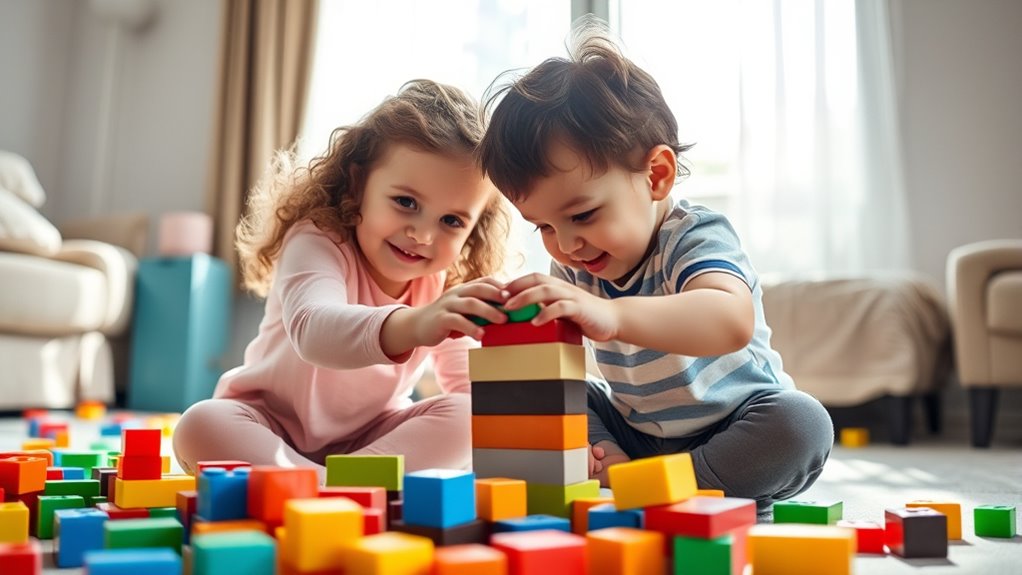
Although many think of sibling relationships as mere companionship, they play an important role in fostering cognitive and social development. Engaging in play with your siblings sharpens your understanding of others’ emotions and thoughts.
Through cooperative play, you enhance your Theory of Mind, learning to see things from different perspectives. Older siblings often model behaviors and skills, helping you develop problem-solving abilities and empathy.
These shared experiences teach you crucial social skills like negotiation and conflict resolution. Sibling interactions provide a unique context for social learning, mimicking peer relationships more closely than interactions with parents. Engaging in activities with educational and skill-building toys can further enhance these developmental benefits.
Strategies for Encouraging Cooperative Play
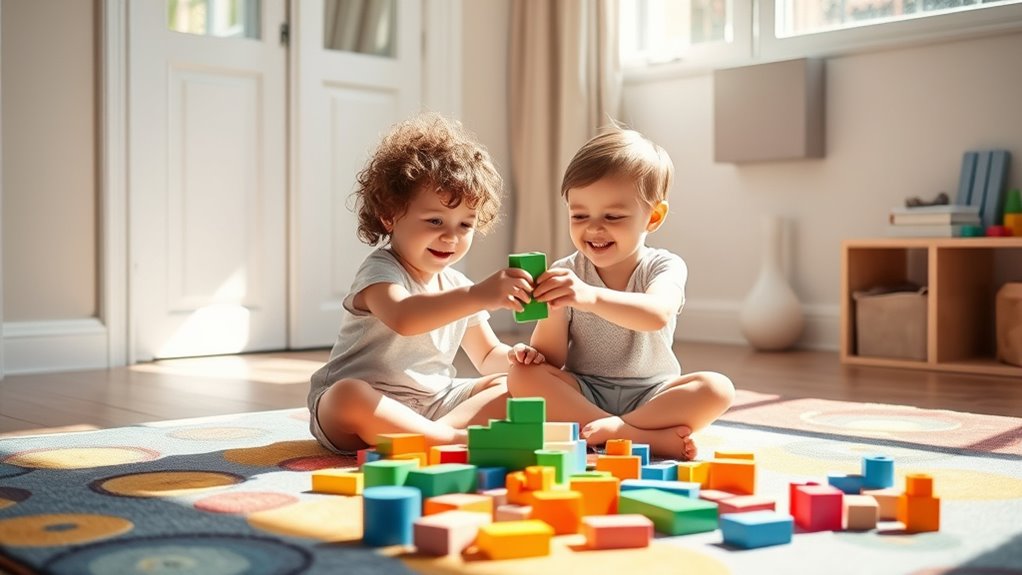
Creating a nurturing environment for cooperative play can considerably strengthen sibling bonds. Start by selecting cooperative games, like board games, that emphasize teamwork. Additionally, fostering trust issues through consistent encouragement and support can help build a solid foundation for their interactions. Engaging in activities that promote early socialization helps children learn to work together effectively. Regular outings to puppy training classes can enhance their ability to adapt and cooperate. Incorporating educational toys into their playtime can further enhance their collaborative skills and cognitive development.
Share the load by creating activities where each child has their own version, reducing competition. Choose fun activities that spark laughter, enhancing connections.
Role modeling is key; older siblings can guide younger ones in mutual support activities. Set clear guidelines for sharing toys and enforce them consistently to promote fairness.
Assign roles during pretend play to encourage leadership and teamwork. Finally, celebrate shared achievements to reinforce collaboration. Incorporating elements of beetroot puree into snack time can also provide nutritious boosts during playtime, encouraging healthy habits.
The Role of Empathy in Strengthening Bonds
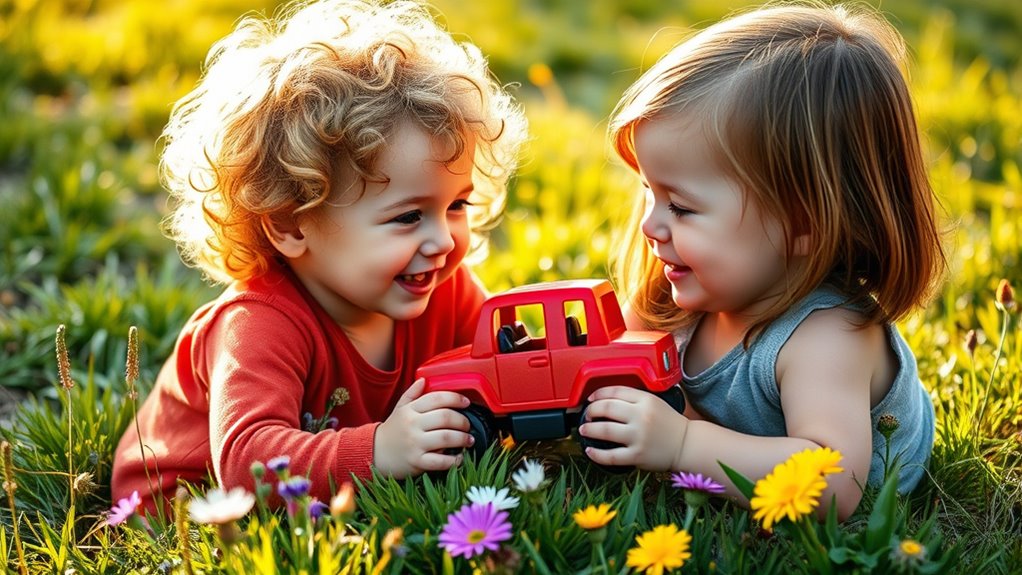
Empathy plays an essential role in strengthening sibling bonds, as it allows children to connect on a deeper emotional level. By understanding each other’s perspectives and feelings, siblings can cultivate a supportive environment that enhances their emotional and social skills.
When you encourage empathy between your children, they learn to appreciate each other’s needs, fostering a strong sense of unity. Sibling interactions serve as a unique platform for empathy development, helping them manage emotions and navigate conflicts effectively.
As a parent, modeling empathetic behavior is vital; it creates a safe space for your children to express themselves. This nurturing approach not only strengthens their sibling relationship but also contributes positively to their overall mental health and well-being. Additionally, fostering empathy among siblings can lead to increased emotional resilience, which is crucial in navigating various challenges as they grow.
Managing Conflicts and Building Resolution Skills

Managing conflicts is a natural part of sibling relationships, and when handled effectively, it can lead to stronger bonds and improved resolution skills.
Start by modeling healthy conflict resolution techniques, like using “I feel” statements to express emotions without blame. Encourage your children to calm down before addressing issues and brainstorm solutions together.
Structured mediation methods, such as the stoplight method, can help categorize conflicts and guide the resolution process. Remember, parental involvement is essential; remain calm and facilitate fair negotiations.
Use visual aids to remind them of effective strategies and promote teamwork opportunities. By consistently applying these techniques, you’ll foster emotional regulation and communication skills, empowering your siblings to resolve conflicts independently.
Long-Term Benefits of Positive Sibling Relationships
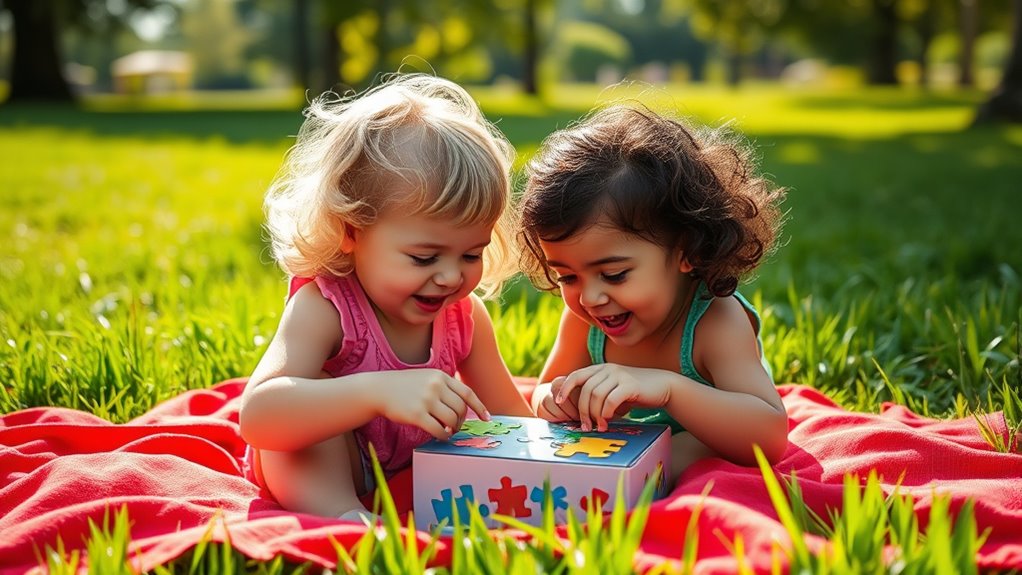
Positive sibling relationships offer significant long-term benefits that extend well beyond childhood. These bonds boost your self-esteem and protect against feelings of loneliness and depression.
With siblings by your side, you gain emotional support, which enhances your overall mental health. Close sibling ties can help buffer against stressful events, while fractured relationships may increase anxiety or depression later in life.
Emotional support from siblings significantly boosts mental health and helps buffer against stress and anxiety.
Additionally, siblings serve as role models, helping you develop essential social skills and emotional regulation. Positive interactions promote empathy, sharing, and cooperation, shaping your identity.
As you grow, these connections foster responsibility and problem-solving skills, laying the groundwork for healthy relationships, academic success, and lifelong support that can enrich your life well into adulthood.
Creating Shared Experiences to Foster Connections
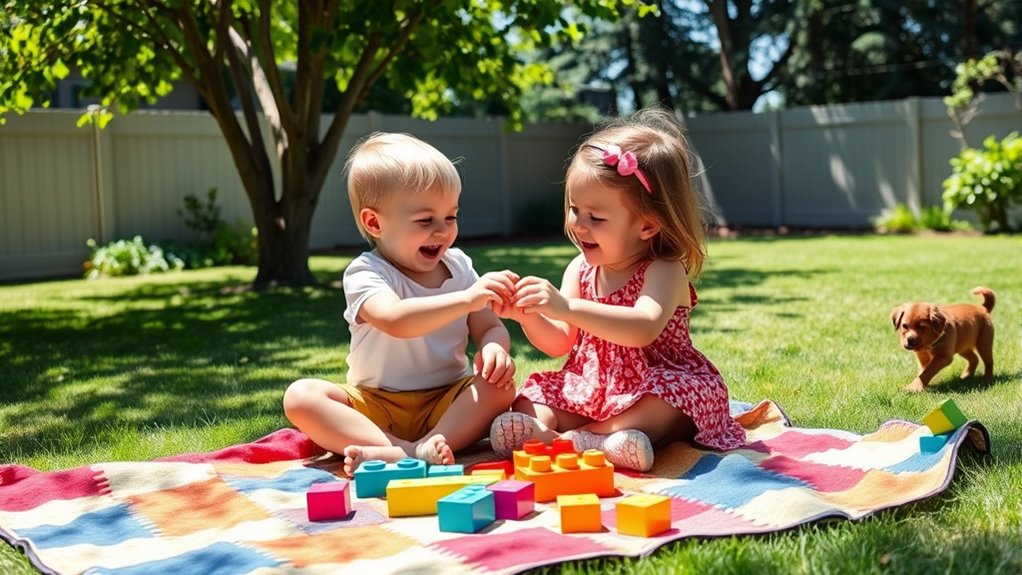
While fostering connections between siblings can sometimes be challenging, creating shared experiences is a powerful way to strengthen their bond.
Engage your toddlers in age-sensitive activities like group games or collaborative puzzles that promote teamwork. Encourage creative play through arts and crafts, or involve them in simple cooking tasks that build collaboration. Outdoor games can also provide fun opportunities for interaction.
Support emotional expression by helping them understand and validate each other’s feelings. Schedule regular shared events to nurture unity, while ensuring each child gets individual attention to prevent rivalry.
Celebrate their successes and encourage empathy using role modeling and constructive conflict resolution strategies. By fostering these shared moments, you’ll help deepen their connection and create lasting memories.
Frequently Asked Questions
How Can I Tell if My Children Have a Healthy Sibling Relationship?
You can tell if your children have a healthy sibling relationship by observing their emotional expressions towards each other.
If they engage in shared activities and show physical affection, it’s a good sign.
Notice how they handle conflicts—effective resolution indicates maturity.
Also, pay attention to their support for one another and their ability to communicate openly.
Frequent positive interactions and feelings of safety in expressing emotions further suggest a strong sibling bond.
What Signs Indicate Sibling Rivalry Is Becoming Problematic?
If you notice frequent fighting or unresolved conflicts between your kids, that’s a clear sign sibling rivalry is becoming problematic.
Look for lack of warmth in their interactions, persistent aggressive behaviors, or excessive possessiveness over toys.
Behavioral regressions, like thumb-sucking or bedwetting, can also indicate stress from rivalry.
Emotional withdrawal or clinginess may suggest they’re struggling with their relationship too.
Addressing these signs early can help restore harmony in your home.
How Do Cultural Differences Affect Sibling Relationships?
Cultural differences shape sibling relationships greatly.
In collectivist cultures, you might find siblings working together closely, prioritizing family needs over individual desires. This fosters strong bonds and caretaking roles, especially for older siblings.
In contrast, individualistic cultures may encourage more independence, leading to less intense sibling interactions.
Understanding these differences can help you navigate sibling dynamics, ensuring that you respect cultural values while fostering healthy relationships among siblings.
Should I Intervene in Every Sibling Conflict?
You might think jumping in at every sibling squabble is the best approach, but that’s not always true.
Sometimes, it’s better to let them work it out themselves. Assess the situation first—if it’s minor, let them develop problem-solving skills. If it escalates, step in with guidance.
Balancing intervention with independence helps them learn and grow. Remember, fostering their conflict resolution skills today can lead to stronger bonds tomorrow.
Are There Specific Activities to Avoid When Fostering Sibling Bonds?
When fostering sibling bonds, you should avoid activities that promote competition or individual achievements.
Steer clear of competitive board games and high-stakes sports, as these can heighten rivalry. Don’t focus on praising one child over another, which can lead to resentment.
Also, skip time-sensitive challenges that increase stress. Instead, opt for cooperative games and shared projects that encourage teamwork and mutual appreciation, fostering a positive and harmonious environment for your children.
Conclusion
As you nurture your toddlers’ sibling relationships, remember that these bonds can shape their futures. Like the roots of a sturdy tree, strong sibling ties provide support and stability throughout life. By fostering empathy, encouraging cooperative play, and creating shared experiences, you’re not just helping them get along today; you’re planting seeds for lifelong friendships that can weather any storm. Embrace the journey—you’re not just raising siblings; you’re cultivating a lifelong support system.
